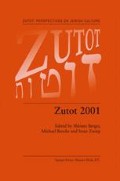Abstract
There is something fascinating about the troubadours of medieval Provence. The idea, therefore, that Hebrew poets created a troubadour tradition of their own seems just as tantalizing today as it did some twenty years ago, when Hayyim Schirmann first remarked on this very possibility.1 Already in an important article from 1949 Schirmann discussed the features which one Hebrew poet, Isaac ha-Gorni, seems to have learned from the troubadours: the use of a senhal,or ‘code name;’ the frequent mention of musical instruments; and the poetic battles, or tenso,that ha-Gorni conducted with other Hebrew poets of his day, such as Abraham ha-Bedarsi and Isaiah ben Devash.2 What this paper hopes to add to the discussion is a suggestion that more than incorporate various elements of troubadour poetry into his work, Isaac ha-Gorni actively cultivated a specific poetic persona in his poetry: the persona of a wandering professional troubadour, or, as they were called in the Occitan tongue, a jongleur. 3
Access this chapter
Tax calculation will be finalised at checkout
Purchases are for personal use only
Preview
Unable to display preview. Download preview PDF.
References
Personal communication by Dr. Ulf Haxen of the Royal Library, Copenhagen. I would like to thank Dr. Haxen for his perceptive comments on an earlier draft of this paper presented at the Colloquium for Medieval Hebrew Poetry, held in Oxford, July z000.
Hayyim Schirmann, ‘Yitshak ha-Gorni, meshorer civri mi-provans’, in Le-toledot hashirah ve-ha-drama ha-‘ivrit I, Jerusalem 1979, 421–438.
The popular distinction today between the ‘aristocratic troubadour’ and the ’ lowly jongleur’ is not supported by the sources, which — at least in the later part of the troubadour tradition — appears to use the terms indiscriminately. See R. E. Harvey, ‘Joglars and the Professional Status of the Early Troubadours’, Medium Aevum 6z.z (1993) 221–241.
For a discussion of troubadour praxis and performance, see Harvey, ibid., and H. van der Werf, ‘Music’, in F.R.P. Akehurst and J.M. Davis, eds, A Handbook of the Troubadours, Berkeley 1995, 121–164.
M. Egan (trans.), The Vidas of the Troubadours, New York/London 1984, xxvi-xxviii.
Egan, The Vidas of the Troubadours, 36.
Maigret, puiat m’es el cap’, in E Naudieth, ‘Der Trobader G. Magret’, Beihefte z. Zeit. F. Rom Phil. 52. (1914) 135.
Totz tos afaires es nienz’, in J. Anglade, Annales du Midi 31–3z (1919–1920) 292, no. xvii.
Emperador avem de tal maneira’, in J. Anglade, Les poésies de Peire Vidal, Paris 1923, 66.
Qui vos dara respieg Dieu lo maldia’, in H. Carstens, Die Tenzonen aus dem Kreis der Trobadors Gui, Eble und Peire d’Uisel, Koenigsberg 1914, 95.
Tot a estru’ and ‘Seigner N’Audric’, in J.M.L. Dejeanne, Poésies complets du troubadour Marcabru, Toulouse 1909, 94 and 99•
Harvey, ‘Joglars and the Professional Status’, zz6.
Cantarai d’aquestz trobadors’, in E Goldin (trans.), Lyrics of the Troubadours, New York 1973, 170.
Egan, The Vidas of the Troubadours, 109.
Ibid., 37.
Elizabeth W. Poe, ‘Vidas and Razos’ in A Handbook of the Troubadours, 193
Ha-Gorni’s poems were published by A.M. Habermann (without vocalisation) in Shire Avraham ha-Bedarsi we-Yitshak ha-Gorni we-hugam, Jerusalem 1968, 2. 9–44. For a selection of ha-Gorni’s poems, complete with vocalisation and notes, see Schirmann, Hashirah ha ‘ivrit bi-sefarad u-bi-provans.
Habermann, Shire Avraham ha-Bedarsi, 3z.
Schirmann, Yitshak ha-Gorni, meshorer ‘ivri mi-provans’, 42.1.
Ibid., 424, 42$, 432–433Habermann, Shire Avraham ha-Bedarsi, 29.
An amusing application of the phrase used in Job 1:7 to refer to Satan.
Cf. the vidas for Guillem IX, Cercamon, Arnaut de Marueil and Elias Cairel, published in Egan, The Vidas of the Troubadours. The act of wandering (phrased in different words) is also found in the vidas for such troubadours as Aimeric de Peguilhan, Elias de Barjols, and Guiraut de Borneill, to name just a few.
Yitshak ha-Gorni, meshorer ‘ivri mi-provans’, 425.
Habermann, Shire Avraham ha-Bedarsi, 3z; 11. 1-z, also printed (with vocalized text and notes) in Schirmann, Ha-shirah ha-‘ivrit bi-sefarad u-bi-provans.
Author information
Authors and Affiliations
Editor information
Editors and Affiliations
Rights and permissions
Copyright information
© 2002 Springer Science+Business Media Dordrecht
About this chapter
Cite this chapter
Brener, A. (2002). Isaac Ha-Gorni and the Troubadour Persona. In: Berger, S., Brocke, M., Zwiep, I. (eds) Zutot 2001. Zutot: Perspectives on Jewish Culture, vol 1. Springer, Dordrecht. https://doi.org/10.1007/978-94-017-3730-2_11
Download citation
DOI: https://doi.org/10.1007/978-94-017-3730-2_11
Publisher Name: Springer, Dordrecht
Print ISBN: 978-94-017-3732-6
Online ISBN: 978-94-017-3730-2
eBook Packages: Springer Book Archive

